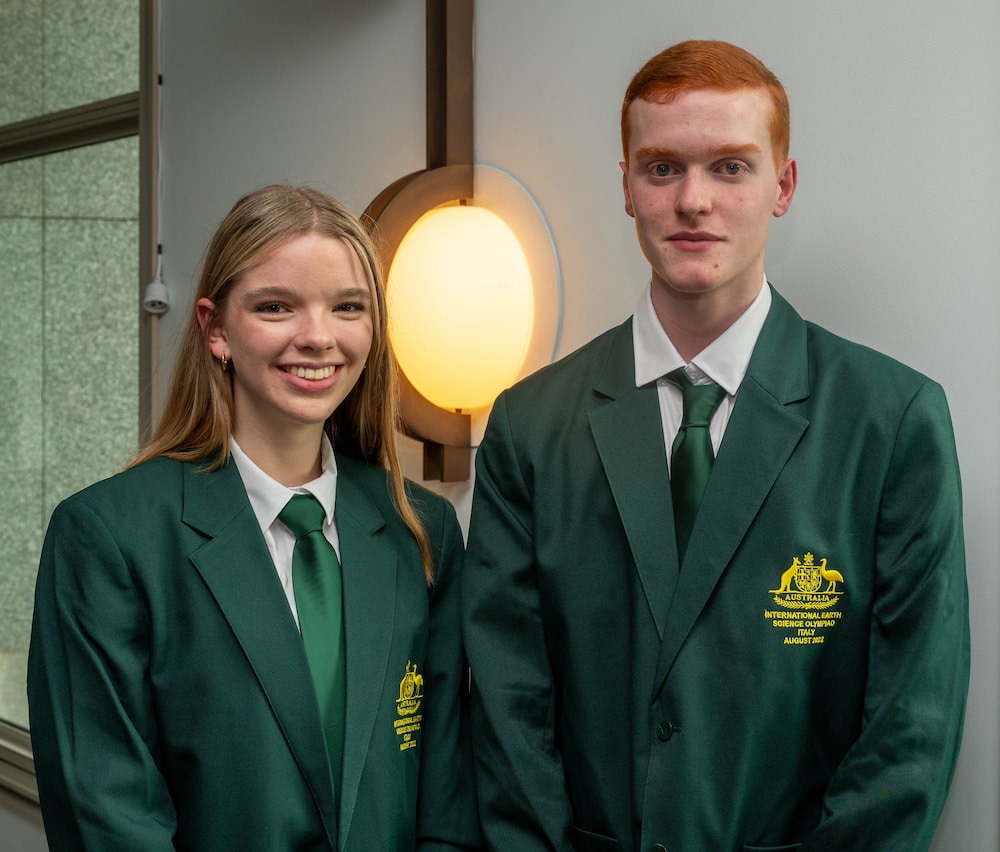Narrabundah College Year 12 student Adrian Lehane gave a stellar performance at the International Science Olympiads, the world’s most difficult science competition, recently. The budding young astrophysicist won two gold medals in the Earth Science Olympiad, while another Canberra student, Georgia Tonkin, from Merici College, won bronze.
Altogether, it was one of Australia’s most successful years, said Alyssa Weirman, director of Australian Science Innovations (ASI), which organises the Australian preliminaries.
Competing against 800 students from 89 countries in July and August, the Australian team maintained the nation’s ranking in the top 20; won a haul of medals – five gold, seven silver, and three bronze; and topped the Earth Science Olympiad for the second year running, with an “amazing” four gold, three silver, and one bronze.
ASI describes the International Science Olympiads as the Olympic Games for science students; challenges cover subjects including earth science, biology, chemistry, and physics.
“The Olympiad is a competition within the international science community to test minds against one another, to see who is best at science,” Ms Weirman explained.
“Not only do the students get to represent their country and battle it out for the top capability of science, they also get to develop international networks with other science students. It’s an opportunity for them to connect with others who are also really interested in science. That’s not always possible for students in their own communities. So, there are many benefits for the students.”
Due to COVID-19, this year’s events were held online – earth science, for instance, from Italy.
Earth science combines skills in geology, meteorology, environmental science, and terrestrial astronomy to understand the processes that shape our planet, and to look for solutions to problems such as climate change, protecting natural resources, environmental sustainability, and mitigating natural disasters.
Australia punches above its weight in that field, Ms Weirman said. That, she believes, is “incredibly important with all the issues we face around decarbonisation and climate change. We have students coming through the school system who are capable of dealing with those changes.”
For Adrian, his week-long event included individual exams on astronomy, volcanology, and the climate (where he earned his gold medal); working with students from all over the world on a presentation about feedback loops and climate change (his group won a gold medal); and a presentation by the Australian team on microplastics (silver).
Adrian said he was “quite happy” to receive his gold medal. “I’m glad all the hard work paid off!”
To be selected to compete in the Olympiads, Australian competitors must take part in the Australian Science Olympiad (ASO) exams and summer school, run by Australian Science Innovations. (This year, 8,500 students registered for the exams, Ms Weirman said.)
“It’s been many years in the making of just doing science competitions, and the summer school twice, and finally getting selected for the Australian team,” Adrian said.
Now, Adrian hopes to study astronomy and astrophysics at the Australian National University, and from there, research and work at different institutions around the world.
“I like science, and in particular astronomy and astrophysics, because it allows you to explore and ask questions about the world,” he said. “There are lots of things that can be investigated, and you can find out stuff about them. I enjoy applying logic, maths, and problem solving to learn about these things.”
Previous Australian International Science Olympians include Elizabeth New, chemistry professor at the University of Sydney; Duncan Watts, professor of computer science, communications, and business at the University of Pennsylvania; and Dr Laura McKemmish, quantum chemist and molecular physicist at UNSW.
Ninety-five percent of the students who take part in the summer school want to pursue a science career in order to make a difference for future generations, Ms Weirman said.
“Some of the questions facing humanity – like climate change, like decarbonisation, like moving to a new form of energy beyond fossil fuels – are really challenging, difficult questions. In order for Australia and humanity to answer those questions, we need everybody to be skilled in science, and we need to really support those students who show an aptitude and a capability in the scientific area, so that they have that capability to answer those questions.
“This is a turning point for humanity and for Australia. It’s an opportunity for us to build those skills, to build that capability, and to move into a different framework than we’ve traditionally been in, to be much more technologically focused, and which could lead to a much more advanced society.
“It’s a really exciting time to be alive. That can seem a little bit strange after COVID. But there are so many opportunities if we just take hold of them!”
ASO exams, held each August, are the first step for high school students interested in representing Australia in the International Science Olympiads. Students are selected for the summer school based on their exam results. Registrations for the 2023 exams open mid next year. For more information, visit www.asi.edu.au.
Ms Weirman encouraged students interested in the Olympiads to talk to their science teacher. ASI also has a web resource, Olympiads Online, where students can prepare for the exam.
“You don’t have to be the smartest kid in school to become a great scientist,” she said. “Science is about problem solving and critical thinking. The very best outcomes can be achieved by having a diversity of thought, background, and experience in the science community. Just like the sporting Olympics, the key to success is commitment, perseverance, practice, and training.”
Olympiad programs are funded through the Australian Government’s National Innovation and Science Agenda. Additional support for the Science Olympiads is provided by the Australian National University.



